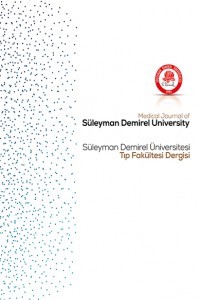BİR DİŞ HEKİMLİĞİ FAKÜLTESİNDE LİSANS ÖĞRENCİLERİNİN EMPATİ DÜZEYLERİNİN DEĞERLENDİRİLMESİ
Demografik faktörler, diş hekimliği eğitimi, empati
THE EVALUATION OF EMPATHY LEVELS OF UNDERGRADUATE STUDENTS OF A FACULTY OF DENTISTRY
Demographic factors, dental education, empathy,
___
- 1. Ersoy EG, Köşger F. Empati: Tanımı ve önemi. Osmangazi Tıp Dergisi/Osmangazi Journal of Medicine 2016;38(2):9-17.
- 2. Naguib GH, Sindi AM, Attar MH, Alshouibi EN, Hamed MT. A Cross-sectional study of empathy among dental students at King Abdulaziz University. J Dent Educ 2020;84(1):22-26.
- 3. Brekalo Prso I, Mocny-Pachońska K, Trzcionka A, Pezelj-Ribaric S, Paljevic E, Tanasiewicz M, et al. Empathy amongst dental students: An institutional cross-sectional survey in Poland and Croatia. Eur J Dent Educ 2020;24(4):687-694.
- 4. Baloş Tuncer B, Canıgür Bavbek N, Arslan Avan B, Çelik B, Tuncer C. The influence of clinical training level on the empathy levels of undergraduate and postgraduate dental students. Acta Odontol Turc 2021;38(1):1-7.
- 5. Carvajal M, López S, Sarabia-Alvarez P, Fontealba J, Padilla M, Sumi J, et al. Empathy levels of dental faculty and students: A survey study at an academic dental ınstitution in Chile. J Dent Educ 2019;83(10):1134-1141.
- 6. Ghimire S, Dixit PB, Roy DK, Dhital S, Dahal S. An assessment of empathy levels of dental students’ in Nepal: A cross-sectional comparative study. Journal of Kathmandu Medical College 2020;8(3):146-150.
- 7. Ameh PO, Uti OG, Daramola OO. Empathy among dental students in a Nigerian institution. Eur J Dent Educ 2019;23(2):135- 142.
- 8. Babar MG, Omar H, Lim LP, Khan SA, Mitha S, Ahmad SFB, et al. An assessment of dental students’ empathy levels in Malaysia. Int J Med Educ 2013;21(4):223-229.
- 9. Akgün Ö, Akdeniz M, Kavukcu E, Avcı HH. Medical students' empathy level differences by medical year, gender, and specialty ınterest in Akdeniz University. J Med Educ Curric Dev 2020;7:2382120520940658.
- 10. Demirbaş N, Karaoğlu N. The evaluation of empathy and communication skills in medical students: A descriptive study. Eurasian JHS 2022;5(2): 24-32.
- 11. Aggarwal VP, Garg R, Goyal N, Kaur P, Singhal S, Singla N, et al. Exploring the missing link - Empathy among dental students: An institutional cross-sectional survey. Dent Res J 2016;13:419-423.
- 12. Javed MQ. The evaluation of empathy level of undergraduate dental students in Pakistan: A cross-Sectional study. J Ayub Med Coll Abbottabad. 2019;31(3):402-406.
- 13. Yarascavitch C, Regehr G, Hodges B, Haas DA. Changes in dental student empathy during training. J Dent Educ 2009;73(4):509-517.
- 14. Hojat M, Vergare MJ, Maxwell K, Brainard G, Herrine SK, Isenberg GA, et al. The devil is in the third year: a longitudinal study of erosion of empathy in medical school. Acad Med 2009;84(9):1182-1191.
- 15. Hojat M, Mangione S, Nasca TJ, Cohen MJM, Gonnella JS, Erdmann JB, et al. The Jefferson scale of physician empathy: Development and preliminary psychometric data. Educational and Psychological Measurement 2001;61(2):349-365.
- 16. Gonullu I, Oztuna D. A Turkish adaptation of the student version of the Jefferson scale of physician empathy. Marmara Medical Journal 2012;25:87-92.
- 17. Igde FA, Sahin MK. Changes in empathy during medical education: An example from Turkey. Pak J Med Sci 2017;33(5):1177- 1181.
- 18. Emine KAYA, Nursena ÖZTAN. Diş hekimliği fakültesi öğrencilerinin empati düzeylerinin değerlendirilmesi: Kesitsel bir çalışma. Turkiye Klinikleri J Dental Sci 2022;28(3):576-581.
- 19. Güneşer R. Diş hekimliği fakültesi öğrencilerinin iletişim becerileri ve empatik eğilimlerinin değerlendirilmesi: Tanımlayıcı bir çalışma. Turkiye Klinikleri J Dental Sci 2022;28(3):682-690
- 20. Mocny-Pachonska K, Łanowy P, Trzcionka A, Skaba D, Tanasiewicz M. Gender related changes of empathy level among Polish dental students over the course of training. Medicine 2020;99:1(e18470).
- 21. Karaoglu N, Pekcan S, Yilmaz S. Are problem based scenarios supporting the positive affect and empathy of medical students? Procedia - Social and Behavioral Sciences 2013;82:101-107.
- ISSN: 1300-7416
- Yayın Aralığı: Yılda 4 Sayı
- Başlangıç: 2015
- Yayıncı: Süleyman Demirel Üniversitesi
Hilal YAKUT İPEKOĞLU, Giray KOLCU
Fadime MUTLU İÇDUYGU, Egemen AKGÜN, Ebru ALP, Sibel DOĞUİZİ, Murat Atabey ÖZER
PLAZMA APELİN DÜZEYİ VE PRE-EKLAMPSİ VAKALARI ARASINDAKİ BAĞLANTININ ARAŞTIRILMASI
Rahim KOCABAŞ, Melike GEYİK BAYMAN, Fatih ZEYTİN, Ercan KARABULUT, Mehmet AKÖZ
METOTREKSAT ARACILI NEFROTOKSİSİTEDE RAMELTEONUN KORUYUCU ETKİSİNİN DEĞERLENDİRİLMESİ
Halil İbrahim BÜYÜKBAYRAM, Dilek BAYRAM, Hatice Kübra DOĞAN
HEMŞİRELERİN GÖĞÜS CERRAHİSİ UYGULAMALARI HAKKINDAKİ BİLGİ DÜZEYLERİ
Hasan Ekrem ÇAMAŞ, Süleyman Emre AKIN
GEBELIKTE AKUT APANDISITLE İLIŞKILI PARAMETRELER
Samet ŞAHİN, Eyüp Murat YILMAZ, Mahir KIRNAP, Ethem BİLGİÇ, Ahmet Ender DEMİRKIRAN
Hamide COŞKUN ERÇELİK, Vildan KAYA, Tuğçe ÇAMLICA, Zehra SEZGİNER, Betül ŞAVRAN, Fatma BÜLBÜL, Derya ÖZDEMİR, Elif BAYER, Sabriye ERCAN, Rasih YAZKAN
Muhammet Yusuf TEPEBAŞI, Perihan SEZGİNER
SPOR HEKİMLİĞİ BAKIŞ AÇISIYLA HAREKET ANALİZİ SİSTEMLERİ VE BİYOMEKANİK
